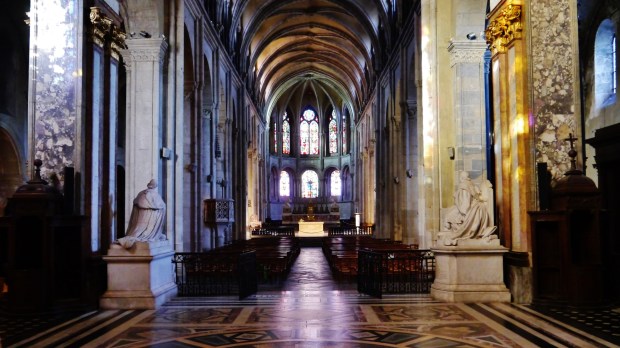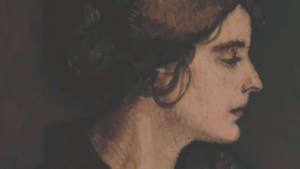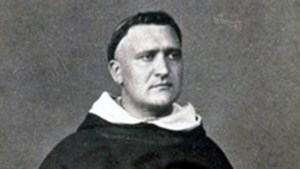Blessed Jean-Joseph Lataste was born in France in 1832, and became a Dominican Friar at the age of 25. As a young priest, he was asked to preach a retreat at a women’s prison in Cadillac, in the south of France. The women had a reputation for their crimes, and were despised in society. But Fr. Lataste knew God’s mercy, and came with hope.
He began by greeting the women with love: “My dear sisters …” He acknowledged their pain, their sorrow, the less-than-dignified conditions they were living in.
“You are not happy here, are you? There is the incessant work, the frightful silence, which brings you continually face to face with yourself. There are the rules and the orders that must be obeyed. There is the deprivation of all the comforts, all the joys of life, absolute poverty, and more than anything else, the separation from all those who are dear to you, all those you have loved… All that is very hard and distressing.”
But then, like a good father, he broke through their isolation and misery with solidarity and tenderness. He revealed to them the Heart of God their Father, who always draws near to us.
“Yet there are others who were free, young, surrounded by comforts and pleasures, and who have voluntarily renounced all these things, and have chosen what you have here… there are the Religious. What could have caused these souls to make such a choice? Either they are crazy or they hope to obtain something much better than all they have given up, and it is evident they are not disappointed. If you could look into their hearts as the priest can in the confessional, then you would see a peace and joy and happiness that would cause the greatest and most privileged of this world to weep with envy.
To love God and to know that one is loved by Him… that is the only real happiness on earth.”
Fr. Lataste reminded them of the great Saints, revered by all in the Church, who were once great sinners. He showed them that even the greatest sinners can be completely transformed by grace. As Jesus Himself said, “I tell you, her many sins have been forgiven; hence, she has shown great love. But the one to whom little is forgiven, loves little.”
Fr. Lataste encouraged the women: “God does not ask us what we were; He only cares about what we are now.”
Many of the prisoners were moved to go to Confession and be reconciled to the Lord. He noticed a palpable change in the atmosphere of the prison – light was breaking into the darkness, suffering hearts were being healed. But their external circumstances remained oppressive. So he challenged the women to make a radical choice:
“It is true that [some] have freely chosen what you endure by force. But in the sight of God, that which was originally forced becomes voluntary when it is voluntarily accepted… Say to Him, ‘I am kept here by force, but I give myself to you freely and completely. I will be yours all my life. I will die rather than ever cease to belong to you.’”
Fr. Lataste invited the women to choose what they had not chosen – to accept the reality of their circumstances, and to live totally alive to the even deeper reality of God’s love and presence among them. He made a remarkable promise to them: that God would actually accept their offering as if they had chosen the way of life of a Religious from the beginning, and so transform the prison into a cloister – full of love, light, and life.
At the close of the retreat, Fr. Lataste was moved to his core.
“I must tell you – all of you – how deeply I have been touched by you. When I have urged some of you to be patient and offer your suffering to God, you have replied: ‘Oh, yes, father. It is so miserable here, I have suffered so much, but I never allow a day to pass without thanking God for bringing me here. Deep in my heart there is a great joy, since I love Him. I would never have believed that one could find so much joy in loving.’ There were tears in your voice, but through your tears you continued: ‘I am so happy! Oh, if I had only known before! I am so happy!’”
This freedom and peace is available to each one of us as we embrace God’s will and bear the many crosses of our lives. Jesus chose in love to take on our misery and sin in order to bring about our salvation. In doing so, He promised us that we are never alone in our sufferings.
In His prayer before the Lord in the prison, Fr. Lataste asked Jesus,
“What have you come to do in this place of expiation and suffering, this home of the poor and unfortunate?” Jesus replied, “This is a place of suffering. That is sufficient to make it my domain. I am with those who suffer; I do not leave them in tribulation, and one day I shall take them to myself, give them their reward and glorify them.”
By choosing what we have not chosen – choosing to accept whatever God sends us, even the mystery of suffering, knowing that He only allows it to bring about a greater good than if it hadn’t happened at all – we unite ourselves to Jesus, who said, “No one takes [my life] from me, but I lay it down of my own accord.” (Jn 10:18) Then we find that our circumstances, which we once rebelled against, are suddenly filled with meaning and power and love, as we participate in the Lord’s work of salvation.
And then an even more stunning transformation occurs, within us: We discover immense dignity, joy, and peace in the privilege of helping Jesus bring souls to heaven. May we open our hearts to embrace whatever God allows, that we may exclaim with the same joy as the women of Cadillac prison: “I am so happy! Oh, if I had only known before! I am so happy!”
~
See more about Fr. Lataste’s work, the order he founded, and about the Rumer Godden novel that draws from it:



